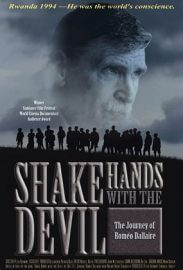Enjoy a free preview via Film Discovery! Click here !
Enjoy a free preview via Film Discovery! Click here !
Enjoy a free preview via Film Discovery! Click here !
Enjoy a free preview via Film Discovery! Click here !

https://www.filmplatform.net/product/shake-hands-devil
In 100 nightmarish days more than 800,000 men, women, and children were brutally murdered during the Rwandan genocide. The victims were Tutsi and moderate Hutus who supported them. Canadian General Roméo Dallaire was thrown into a country he barely understood, leading a small contingent of largely ill-equipped troops who did not want to be there. Unsupported by U.N. headquarters, Dallaire and his handful of soldiers were incapable of stopping the killing. This experience led to Dallaire’s own life tragedy as he dealt with the psychological fallout of witnessing a genocide he was powerless to stop.

I’m embarrassed to tell you that, like most people, I “missed” the Rwanda genocide. I vaguely remember media reports of tribal warfare in an obscure central-African country. But almost every night during those 100 days (April-June, 1994) the OJ Simpson Trial and the Tonya Harding/Nancy Kerrigan incident dominated the news.
After the horrific mass killings in Rwanda ended, we began hearing about Lt. General Roméo Dallaire – the Canadian who commanded the UN troops that were supposed to keep peace in Rwanda – the man who had since attempted suicide, unable to live with the horrific demons that haunt him. After I returned from Rwanda where I’d made another documentary, five years after the genocide, I became determined to track down Roméo Dallaire and see if we could make a film together – in Rwanda.
Although part of him wanted to return, General Dallaire wasn’t quite ready to go back. He was struggling to write his extraordinary book; he was undergoing therapy for post-traumatic stress disorder; he needed to testify at the International Criminal Tribunal for Rwanda in Arusha, Tanzania. And part of him wasn’t sure if going back made sense. What purpose would it serve? How would it affect him?
But after much discussion, Dallaire decided he was ready and able to return in April, 2004. It was the 10th anniversary of the genocide, the Rwandan government had invited him, and he wanted to show his wife, Elizabeth, the special people and places that had taken over his life.
I was honoured that General Dallaire decided to trust me with his story. With financing in place (CBC, Rogers Documentary Fund, Canadian TV Fund), and a talented crew onboard (cameraman John Westheuser, sound-recordist, Ao Loo, PM Patrick Reed, interpreter Jean-Thierry Nkulikiyumukiza and stills photographer Peter Bregg) we arrived in Rwanda for two exhilarating and exhausting weeks.
This film documents that extraordinary emotional journey – back to the killing fields, back to confront the devil, back to break bread with Rwandans who, like Dallaire, had managed to survive the carnage. Our documentary weaves together this return journey with a chronicle of the genocide itself. Back home in Toronto, we shot several interviews: Dallaire’s two Military Assistants in Rwanda, Brent Beardsley and Phil Lancaster; writer Gerald Caplan; UN Special Envoy, Stephen Lewis; CBC’s Michael Enright, Elizabeth Dallaire; and, finally an exhausting four hour debrief with General Dallaire himself.
In the caring hands of skilled editor Michèle Hozer, a tale of horror, deceit, duplicity and ultimately heroism emerged. I found myself having to confront the nature of evil. What is it in human nature that drives people to pick up a machete, go next door, and hack their neighbour to death? What other force of evil turns otherwise decent men and women at the United Nations or in the White House into passive bystanders as 800,000 innocent men, women and children are slaughtered? Despite their denials, these people knew what was happening in Rwanda. Almost daily, General Dallaire sent urgent faxes and made desperate phone calls, pleading for reinforcements that never came and an expanded mandate that was never given.
This is the story of one man who cared, who believes we are our brother’s keeper, who put his life on the line to save tens of thousands of others, who understands that the value of a human life in Rwanda is equal to a human life anywhere in the world. We are proud to share this extraordinary journey with you.
Peter Raymont
“Our film is about one man’s struggle to stop the genocide in Rwanda – and then confront the demons that haunt him still. In shaping the film, I was telling a horrific tale of horror, deceit, duplicity and ultimately heroism.
The most difficult challenge was confronting the nature of evil. What is it in human nature that drives people to pick up a machete, go next door, and hack their neighbour to death? What other force of evil turns otherwise decent men and women at the United Nations or in the White House into passive bystanders as 800,000 innocent men, women and children are slaughtered? Despite their denials, these people knew what was happening in Rwanda. Almost daily, General Dallaire sent urgent faxes and made desperate phone calls, pleading for reinforcements that never came and an expanded mandate that was never given.
Our filmmaking team was honoured to have the opportunity to tell the story of one man who cared, who believes we are our brother’s keeper, who put his life on the line to save tens of thousands of others, who understands that the value of a human life in Rwanda is equal to a human life anywhere in the world.”